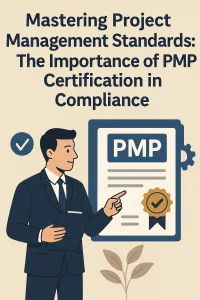Introduction to PMO Culture
The Project Management Office (PMO) plays a pivotal role in ensuring that projects align with organizational goals and are executed efficiently. A PMO is a centralized unit that provides support, governance, and oversight for project management practices within an organization. Its primary functions include standardizing project management processes, facilitating resource allocation, and ensuring that projects are delivered on time and within budget. By establishing a structured approach to project management, the PMO helps organizations achieve strategic objectives and improve overall project performance.
Defining PMO Culture
PMO culture refers to the shared values, beliefs, and behaviors that characterize the environment within a Project Management Office. This culture is crucial as it shapes how team members interact, collaborate, and innovate. A positive PMO culture fosters an atmosphere where team members feel valued and empowered to contribute their ideas and expertise. It encourages open communication, trust, and mutual respect, which are essential for effective teamwork. When a PMO cultivates a strong culture, it not only enhances team morale but also significantly influences project outcomes by promoting engagement and accountability among team members.
The Influence of PMO Culture on Project Outcomes
The culture within a PMO can have a profound impact on the success of projects. A collaborative culture encourages team members to share knowledge and resources, leading to more innovative solutions and improved problem-solving capabilities. When individuals feel comfortable expressing their ideas and concerns, it can lead to better decision-making and a more agile response to challenges. Furthermore, a culture that prioritizes innovation allows teams to explore new methodologies and technologies, which can enhance project efficiency and effectiveness.
Significance of Collaboration and Innovation
Collaboration and innovation are cornerstones of a thriving PMO culture. By fostering collaboration, PMOs can break down silos between departments and encourage cross-functional teamwork. This not only enhances communication but also leads to a more holistic approach to project management, where diverse perspectives contribute to more robust solutions. Innovation, on the other hand, drives continuous improvement and adaptation in project practices. PMOs that embrace innovative thinking are better equipped to navigate the complexities of modern project environments, ultimately leading to higher success rates and greater organizational agility.
The culture within a PMO is a critical factor that influences project success. By defining PMO roles clearly, fostering a collaborative environment, and encouraging innovation, PMO leaders and team managers can create a positive culture that enhances project outcomes and drives organizational success.
Understanding PMO Culture
The Project Management Office (PMO) plays a pivotal role in guiding and supporting project teams. A strong PMO culture is essential for fostering collaboration and innovation, which ultimately leads to successful project outcomes. Here, we explore the key components that contribute to a healthy PMO culture, emphasizing its characteristics, relationship with organizational goals, and impact on team dynamics.
Characteristics of a Strong PMO Culture
- Trust: Trust is the foundation of any effective PMO culture. When team members trust each other and their leaders, they are more likely to share ideas, take risks, and collaborate openly. This trust fosters a safe environment where individuals feel valued and empowered to contribute to the project’s success.
- Respect: A culture of respect ensures that all team members feel acknowledged for their contributions. This respect extends to recognizing diverse perspectives and skills, which can enhance problem-solving and innovation within the team. When respect is ingrained in the PMO culture, it leads to higher morale and job satisfaction.
- Openness: Openness in communication is crucial for a thriving PMO culture. Encouraging team members to express their thoughts, concerns, and feedback without fear of retribution promotes transparency and accountability. This openness not only strengthens relationships but also facilitates the sharing of knowledge and best practices.
- Collaboration: A collaborative culture encourages teamwork and collective problem-solving. By breaking down silos and promoting cross-functional collaboration, PMOs can leverage the strengths of diverse team members, leading to more innovative solutions and improved project outcomes.
Relationship Between PMO Culture and Organizational Goals
The culture within a PMO is closely aligned with the broader organizational goals. A strong PMO culture can drive the following:
- Alignment with Strategic Objectives: When the PMO culture emphasizes collaboration and innovation, it helps ensure that project teams are aligned with the organization’s strategic objectives. This alignment is crucial for prioritizing projects that deliver the most value to the organization.
- Enhanced Agility: A positive PMO culture fosters agility, enabling teams to adapt quickly to changing organizational needs and market conditions. This adaptability is essential for organizations aiming to remain competitive in a fast-paced environment.
- Increased Engagement: A healthy PMO culture can lead to higher levels of employee engagement, which is directly linked to improved performance and productivity. Engaged team members are more likely to be committed to achieving organizational goals and delivering successful projects.
Impact of PMO Culture on Team Dynamics and Project Success
The culture within a PMO significantly influences team dynamics and the overall success of projects:
- Improved Team Dynamics: A strong PMO culture promotes positive interactions among team members, leading to better collaboration and communication. This improved dynamic can reduce conflicts and enhance teamwork, resulting in a more cohesive project team.
- Higher Project Success Rates: Projects that operate within a supportive PMO culture are more likely to succeed. The combination of trust, respect, and openness allows teams to navigate challenges effectively, leading to timely project delivery and achievement of project objectives.
- Innovation and Continuous Improvement: A culture that encourages innovation and learning can lead to continuous improvement in project processes and outcomes. Teams that feel safe to experiment and learn from failures are more likely to develop creative solutions that drive project success.
Fostering a positive and collaborative PMO culture is essential for PMO leaders and team managers aiming to enhance project outcomes. By focusing on trust, respect, openness, and collaboration, PMOs can align with organizational goals, improve team dynamics, and ultimately drive project success.
Fostering Collaboration in PMO Teams
The Project Management Office (PMO) plays a crucial role in ensuring that projects are executed efficiently and effectively. A positive and collaborative culture within the PMO can significantly enhance team performance and project outcomes. Here are some strategies to foster collaboration among project teams:
1. Introduce Collaborative Tools and Technologies
Utilizing the right tools and technologies is essential for facilitating teamwork within PMO teams. Here are some effective options:
- Project Management Software: Tools like Trello, Asana, or Microsoft Project can help teams track progress, assign tasks, and manage deadlines collaboratively.
- Communication Platforms: Implementing platforms such as Slack or Microsoft Teams allows for real-time communication, reducing delays and enhancing information sharing.
- Document Sharing Solutions: Tools like Google Drive or SharePoint enable team members to collaborate on documents simultaneously, ensuring everyone has access to the latest information.
By integrating these tools, PMOs can create an environment where collaboration is seamless and efficient, allowing team members to focus on their tasks without the hindrance of communication barriers.
2. Importance of Regular Communication and Feedback Loops
Regular communication is vital for maintaining alignment and fostering a collaborative culture. Here are some practices to consider:
- Daily Stand-ups: Short, daily meetings can help teams share updates, discuss challenges, and align on priorities. This practice encourages accountability and keeps everyone informed.
- Feedback Mechanisms: Establishing structured feedback loops, such as weekly reviews or retrospectives, allows team members to share insights and learn from each other’s experiences. This not only improves processes but also builds trust among team members.
- Open-Door Policies: Encouraging an open-door policy where team members feel comfortable approaching leadership with ideas or concerns fosters a culture of transparency and collaboration.
By prioritizing communication and feedback, PMOs can create a dynamic environment where team members feel valued and engaged.
3. Team-Building Activities that Promote Trust and Cohesion
Investing in team-building activities is essential for enhancing trust and cohesion within PMO teams. Consider the following approaches:
- Workshops and Training Sessions: Organizing workshops focused on collaboration skills, conflict resolution, or project management methodologies can enhance team dynamics and improve collaboration.
- Social Events: Hosting informal gatherings, such as team lunches or outings, can strengthen relationships among team members, making it easier for them to collaborate effectively in a work setting.
- Collaborative Challenges: Engaging teams in problem-solving challenges or hackathons can foster creativity and teamwork, allowing members to bond over shared goals and experiences.
These activities not only build trust but also create a sense of belonging, which is crucial for a collaborative PMO culture.
Fostering collaboration within PMO teams is essential for driving project success. By introducing collaborative tools, maintaining regular communication, and investing in team-building activities, PMO leaders can cultivate a positive culture that encourages innovation and teamwork. This collaborative environment not only enhances project outcomes but also contributes to the overall satisfaction and engagement of team members.
Encouraging Innovation within the PMO
Fostering a culture of innovation within the Project Management Office (PMO) is essential for driving successful outcomes and enhancing team collaboration. Here are several key points to consider when aiming to promote innovative thinking within project teams:
The Role of Creativity in Project Management
- Creativity as a Catalyst: Creativity is not just an artistic endeavor; it is a critical component of effective project management. Encouraging team members to think outside the box can lead to unique solutions that address complex project challenges. By creating an environment where creative ideas are welcomed, PMOs can enhance problem-solving capabilities and improve project outcomes.
- Diverse Perspectives: A diverse team brings a variety of viewpoints and experiences, which can spark innovative ideas. PMO leaders should actively seek to build teams with varied backgrounds and expertise, as this diversity can lead to richer discussions and more creative solutions.
Frameworks and Methodologies that Encourage Innovation
- Agile Methodology: Agile is a popular framework that emphasizes flexibility, collaboration, and iterative progress. By adopting Agile practices, PMOs can create an environment that encourages experimentation and rapid feedback. This approach allows teams to pivot quickly based on stakeholder input, fostering a culture of continuous improvement and innovation.
- Design Thinking: This methodology focuses on understanding the user experience and encourages teams to empathize with stakeholders. By applying design thinking principles, PMOs can inspire teams to develop innovative solutions that are user-centered, ultimately leading to more successful project outcomes.
- Lean Practices: Lean methodologies aim to maximize value while minimizing waste. By streamlining processes and encouraging teams to identify and eliminate inefficiencies, PMOs can create more space for innovative thinking and experimentation.
Examples of Successful Innovative Projects within PMOs
- Digital Transformation Initiatives: Many PMOs have successfully led digital transformation projects that leverage new technologies to improve efficiency and customer engagement. For instance, a PMO in a large retail organization implemented an innovative inventory management system that utilized AI and machine learning. This project not only streamlined operations but also significantly reduced costs and improved customer satisfaction.
- Sustainability Projects: Another example can be found in PMOs that focus on sustainability initiatives. A PMO in the construction industry developed a project aimed at using sustainable materials and practices. By fostering a culture of innovation, the team was able to create a new building design that reduced energy consumption by 30%, showcasing how innovative thinking can lead to both environmental and economic benefits.
- Cross-Functional Collaboration: A PMO that encouraged cross-functional collaboration between marketing, IT, and product development teams successfully launched a new product line that exceeded sales projections. By breaking down silos and promoting open communication, the PMO facilitated a collaborative environment where innovative ideas could flourish.
Encouraging innovation within the PMO is not just about adopting new methodologies; it is about cultivating a culture that values creativity, collaboration, and diverse perspectives. By implementing frameworks like Agile and Design Thinking, and by learning from successful innovative projects, PMO leaders can foster an environment where teams are empowered to think creatively and drive impactful results. This approach not only enhances project outcomes but also contributes to a more engaged and motivated workforce.
Leadership’s Role in Shaping PMO Culture
The Project Management Office (PMO) plays a crucial role in ensuring that projects align with organizational goals and are executed efficiently. However, the effectiveness of a PMO is not solely determined by its processes and methodologies; it is significantly influenced by the culture fostered within the team. Leadership is pivotal in shaping this culture, particularly in promoting collaboration and innovation. Here are some key points to consider regarding the role of PMO leaders in cultivating a positive PMO culture.
Qualities of Effective PMO Leaders
Effective PMO leaders possess a unique set of qualities that enable them to foster an environment conducive to collaboration and innovation:
- Visionary Thinking: They have a clear vision for the PMO and can communicate this vision effectively to inspire their teams. This clarity helps team members understand their roles in achieving broader organizational objectives.
- Empathy and Emotional Intelligence: Understanding team members’ perspectives and emotions allows leaders to build trust and rapport. This emotional connection encourages open communication and collaboration.
- Adaptability: The ability to adjust strategies and approaches in response to changing project dynamics or team needs is essential. Adaptable leaders can navigate challenges while maintaining team morale.
- Encouragement of Diversity: Effective PMO leaders recognize the value of diverse perspectives and encourage contributions from all team members. This inclusivity fosters innovation and creative problem-solving.
Impact of Leadership Style on Team Morale and Performance
The leadership style adopted by PMO leaders has a profound impact on team morale and performance:
- Transformational Leadership: Leaders who inspire and motivate their teams to exceed expectations can significantly enhance morale. This style encourages team members to take ownership of their work, leading to higher engagement and productivity.
- Participative Leadership: Involving team members in decision-making processes fosters a sense of ownership and accountability. This collaborative approach can lead to improved performance as team members feel valued and heard.
- Transactional Leadership: While this style focuses on structure and rewards, it may not foster the same level of innovation and collaboration. Leaders who rely solely on transactional methods may find it challenging to motivate teams in dynamic project environments.
Strategies for PMO Leaders to Model Desired Cultural Behaviors
To effectively shape a positive PMO culture, leaders can implement several strategies:
- Lead by Example: PMO leaders should embody the values and behaviors they wish to see in their teams. By demonstrating collaboration, open communication, and a willingness to innovate, leaders set the tone for the entire PMO.
- Encourage Open Communication: Creating channels for feedback and discussion allows team members to express their ideas and concerns. Regular check-ins and team meetings can facilitate this open dialogue.
- Recognize and Reward Collaboration: Acknowledging and rewarding collaborative efforts reinforces the importance of teamwork. Leaders can implement recognition programs that celebrate team achievements and innovative solutions.
- Provide Professional Development Opportunities: Investing in training and development helps team members enhance their skills and fosters a culture of continuous improvement. Leaders should encourage participation in workshops, seminars, and other learning opportunities.
- Create a Safe Environment for Innovation: Leaders should cultivate an atmosphere where team members feel safe to share new ideas without fear of criticism. Encouraging experimentation and learning from failures can lead to innovative solutions.
The role of leadership in shaping PMO culture is critical to fostering collaboration and innovation within project teams. By embodying effective leadership qualities, adopting the right leadership style, and implementing strategic initiatives, PMO leaders can create a positive environment that enhances team performance and drives project success.
Measuring PMO Culture Success
The Project Management Office (PMO) plays a crucial role in shaping the culture of collaboration and innovation within project teams. To ensure that the PMO is fostering a positive environment, it is essential to implement effective metrics and assessment tools. Here are some key points to consider when measuring PMO culture success:
Key Performance Indicators (KPIs) for Measuring Collaboration and Innovation
- Team Engagement Scores: Regularly assess team engagement through surveys that measure how involved and motivated team members feel. High engagement scores often correlate with a collaborative culture.
- Collaboration Frequency: Track the number of collaborative sessions, such as meetings, brainstorming sessions, and workshops. Increased collaboration can indicate a thriving PMO culture.
- Innovation Metrics: Measure the number of new ideas generated and implemented within projects. This can include tracking the success rate of innovative solutions and their impact on project outcomes.
- Feedback Loop Effectiveness: Evaluate how effectively feedback is gathered and acted upon. This can be measured by the percentage of feedback that leads to actionable changes within the PMO.
- Cross-Functional Collaboration: Assess the extent of collaboration between different departments or teams. Metrics could include joint projects initiated or the frequency of inter-departmental meetings.
Methods for Gathering Feedback from Team Members
- Surveys and Questionnaires: Utilize anonymous surveys to gather honest feedback from team members about their experiences and perceptions of the PMO culture. Questions should focus on collaboration, support, and innovation.
- Focus Groups: Conduct focus group discussions to dive deeper into specific aspects of PMO culture. This qualitative approach allows for richer insights and the opportunity to explore ideas in detail.
- One-on-One Interviews: Engage in personal interviews with team members to understand their individual experiences and suggestions for improvement. This method can uncover nuanced perspectives that surveys might miss.
- Suggestion Boxes: Implement a digital or physical suggestion box where team members can submit ideas or concerns anonymously. This encourages open communication and can lead to valuable insights.
Iterating and Improving PMO Culture Based on Assessment Results
- Analyze Data Regularly: Establish a routine for analyzing feedback and performance metrics. Regular reviews can help identify trends and areas needing attention.
- Action Plans: Develop action plans based on assessment results. If feedback indicates a lack of collaboration, consider implementing team-building activities or collaborative tools to enhance interaction.
- Celebrate Successes: Recognize and celebrate improvements in PMO culture. Acknowledging achievements can motivate team members and reinforce positive behaviors.
- Continuous Learning: Foster a culture of continuous improvement by encouraging team members to share lessons learned and best practices. This can be facilitated through regular knowledge-sharing sessions.
- Adapt and Evolve: Be willing to adapt strategies based on what the data reveals. A flexible approach allows the PMO to respond to changing team dynamics and project needs effectively.
By focusing on these metrics and methods, PMO leaders and team managers can create a robust framework for measuring and enhancing PMO culture. This proactive approach not only fosters collaboration and innovation but also contributes to the overall success of project outcomes.
Conclusion
The significance of a positive PMO (Project Management Office) culture cannot be overstated. A thriving PMO culture fosters collaboration, innovation, and engagement among project teams, ultimately leading to enhanced project outcomes and organizational success. Here are the key takeaways to consider:
- Importance of PMO Culture: A positive PMO culture is foundational for effective project management. It encourages open communication, trust, and teamwork, which are essential for navigating the complexities of projects. When team members feel valued and supported, they are more likely to contribute creatively and proactively, driving project success and organizational growth.
- Assessing and Improving PMO Culture: PMO leaders and team managers should regularly evaluate their PMO culture. This can be achieved through surveys, feedback sessions, and open discussions with team members. Identifying areas for improvement is crucial; whether it’s enhancing communication channels, providing professional development opportunities, or recognizing team achievements, small changes can lead to significant cultural shifts.
- Resources for Further Reading and Development: To deepen your understanding and enhance your PMO culture, consider exploring the following resources:
- Books: Look for titles focused on organizational culture, team dynamics, and project management best practices.
- Webinars and Workshops: Participate in industry webinars that focus on PMO culture and collaboration strategies.
- Professional Networks: Join PMO-focused groups or forums where leaders share insights and strategies for cultivating a positive culture.
By taking actionable steps to foster a collaborative and innovative PMO culture, you can empower your teams to achieve their full potential. Embrace the journey of cultural transformation within your PMO, and watch as it positively impacts not only project outcomes but also the overall morale and engagement of your team.
Find out more about Shaun Stoltz https://www.shaunstoltz.com/about/.
This post was written by an AI and reviewed/edited by a human.



